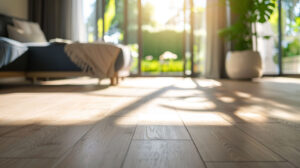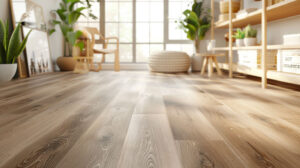
Choosing between LVT and SPC flooring can be confusing.
LVT (Luxury Vinyl Tile1) and SPC (Stone Plastic Composite2) flooring differ mainly in their core composition; LVT has a flexible vinyl core, while SPC features a rigid core made of limestone and PVC. This difference affects their durability, stability, and suitability for various environments.
I faced this dilemma when renovating my own home.
What Is the Difference Between SPC Flooring and LVT Flooring?
Understanding these differences can help you choose the right flooring.
SPC flooring (Stone Plastic Composite2) has a rigid core made of stone and plastic composites, offering more durability and stability, while LVT (Luxury Vinyl Tile1) has a flexible vinyl core, providing more comfort underfoot but less rigidity.

Let’s break down the key differences between SPC and LVT flooring.
Composition
- SPC Flooring: Features a core made from a combination of limestone powder and PVC, creating a dense, rigid core.
- LVT Flooring: Comprises multiple layers of PVC vinyl, resulting in a flexible, softer plank.
Durability and Stability
SPC’s rigid core makes it more resistant to impacts, dents, and temperature fluctuations, making it suitable for high-traffic and commercial areas. LVT, while still durable, is more susceptible to indentation and may expand or contract slightly with temperature changes.
Comfort and Sound
LVT’s flexibility offers a softer feel underfoot, which can be more comfortable for residential spaces. It also tends to be quieter when walked upon compared to SPC flooring.
Installation
Both SPC and LVT often use click-lock systems for easy installation, but SPC’s rigidity allows it to mask minor subfloor imperfections better than LVT.
Cost
Generally, SPC flooring may be slightly more expensive due to its enhanced features, but prices can vary based on brand and quality.
Understanding these aspects can help you decide which flooring suits your needs better.
What Flooring Is Better Than LVT?
Exploring alternatives can lead to better choices.
Floorings like SPC (Stone Plastic Composite2), hardwood, and ceramic tile can be considered better than LVT in terms of durability, longevity, and specific use-cases, depending on your requirements.
While LVT offers many benefits, other flooring options might better suit certain needs.
SPC Flooring
As discussed, SPC provides greater durability and water resistance than LVT, making it preferable for high-traffic or moisture-prone areas.
Hardwood Flooring
Hardwood offers unmatched natural beauty and can increase home value. It’s durable but requires more maintenance and is sensitive to moisture.
Ceramic Tile
Ceramic tiles are extremely durable and waterproof, ideal for bathrooms and kitchens. However, they can be cold underfoot and may require professional installation.
Laminate Flooring
Laminate is a budget-friendly option that mimics the look of wood but may not offer the same level of water resistance as LVT or SPC.
Consider Your Needs
The "better" flooring depends on factors like location, budget, aesthetic preferences, and lifestyle. For instance, families with pets might prioritize scratch resistance, while others might focus on ease of maintenance.
What Is the Difference Between SVP and LVP?
Understanding flooring acronyms can clear up confusion.
SVP (Solid Vinyl Plank3) refers to rigid vinyl flooring, while LVP (Luxury Vinyl Plank4) is flexible vinyl plank flooring; the main difference lies in their core construction and rigidity.
Let’s delve into what sets SVP and LVP apart.
Core Construction
- SVP (Solid Vinyl Plank): Has a solid, rigid core, often similar to SPC flooring, providing enhanced stability and durability.
- LVP (Luxury Vinyl Plank): Features a flexible vinyl core, making it softer and more comfortable underfoot.
Performance
SVP’s rigidity makes it more resistant to dents and less likely to show subfloor imperfections, while LVP’s flexibility allows it to be more forgiving under stress but may make it prone to indentation.
Installation
Both SVP and LVP can use click-lock or glue-down installation methods, but SVP’s rigidity can make installation over uneven surfaces easier.
Use Cases
- SVP: Better for commercial settings or areas with heavy foot traffic.
- LVP: Suitable for residential areas where comfort is a priority.
Understanding these differences helps in selecting the right flooring for your space.
What Is the Difference Between Rigid Core LVP and SPC?
Even within similar categories, differences exist.
Rigid Core LVP (Rigid Core Luxury Vinyl Plank5) is a type of luxury vinyl plank flooring with a rigid core, often made of WPC (Wood Plastic Composite), while SPC flooring (Stone Plastic Composite2) uses a stone-plastic composite core, making SPC denser and more durable.
Let’s compare Rigid Core LVP and SPC.
Core Materials
- Rigid Core LVP: Typically has a WPC core, combining wood fibers and plastic, providing a softer, more cushioned feel.
- SPC Flooring: Uses a stone-plastic composite core, combining limestone powder and PVC for a denser, more rigid plank.
Durability and Stability
SPC’s stone-based core makes it more resistant to impacts and temperature changes than Rigid Core LVP. Rigid Core LVP offers more comfort due to its wood content but may be less stable in extreme conditions.
Thickness and Feel
- Rigid Core LVP: Generally thicker, providing better sound insulation and comfort.
- SPC Flooring: Thinner but denser, offering less cushioning.
Ideal Applications
- SPC Flooring: Best for high-traffic, commercial, or moisture-prone areas.
- Rigid Core LVP: Suitable for residential spaces where comfort is desired.
Understanding these nuances can guide your flooring decision.
What Are the Downsides of SPC Flooring?
Knowing the drawbacks is just as important.
SPC flooring’s downsides include its hardness underfoot, potential for feeling cold, and the need for a perfectly level subfloor to prevent installation issues.
Let’s examine the potential disadvantages of SPC flooring.
Hardness and Comfort
The rigid core that provides durability also makes SPC flooring less forgiving underfoot, which can lead to discomfort during prolonged standing.
Mitigation:
- Use area rugs or mats in high-use areas.
- Consider underlayment for added cushioning.
Temperature Sensitivity
SPC flooring can feel cold, especially in cooler climates.
Mitigation:
- Install radiant floor heating.
- Use insulating underlayment.
Subfloor Requirements
SPC requires a smooth, level subfloor; imperfections can lead to issues like clicking noises or uneven wear.
Mitigation:
- Proper subfloor preparation is essential.
- Professional installation can ensure better results.
Being aware of these downsides can help you plan accordingly.
Do You Need Underlay for SPC Flooring?
Installation questions are common.
While SPC flooring often comes with an attached underlayment, adding an additional underlay can enhance comfort and sound absorption, especially in multi-level homes.
Let’s explore the role of underlayment with SPC flooring.
Benefits of Underlay
- Sound Insulation: Reduces noise transmission between floors.
- Comfort: Adds cushioning underfoot.
- Thermal Insulation: Helps maintain floor temperature.
When Underlay Is Recommended
- If your SPC flooring doesn’t have an attached underlayment.
- In apartments or multi-story homes to minimize noise.
- When extra comfort is desired.
Types of Underlay
- Foam Underlay: Affordable and provides basic insulation.
- Cork Underlay: Offers superior sound absorption and is eco-friendly.
- Rubber Underlay: Durable with excellent sound dampening.
Consult the flooring manufacturer to ensure compatibility with additional underlay.
What Are the Cons of LVT Flooring?
Understanding limitations helps set expectations.
LVT flooring can be prone to indentation, may fade under prolonged sunlight exposure, and might not add as much value to a home as natural materials like hardwood.
Let’s delve into the disadvantages of LVT flooring.
Susceptibility to Indentation
Heavy furniture or sharp objects can dent LVT due to its softer core.
Prevention:
- Use furniture pads.
- Avoid dragging heavy items.
Fading Over Time
Extended exposure to direct sunlight can cause discoloration.
Prevention:
- Use window treatments to block UV rays.
- Consider UV-resistant coatings.
Perceived Value
While LVT is cost-effective, it may not increase property value like hardwood or natural stone.
Considerations:
- Weigh initial cost savings against long-term value.
- Choose high-quality LVT to maximize appeal.
Environmental Concerns
Some LVT products may emit VOCs (Volatile Organic Compounds).
Mitigation:
- Opt for LVT with low VOC certifications.
- Ensure proper ventilation during installation.
Being aware of these cons can inform your flooring choice.
What Type of Flooring Lasts the Longest?
Longevity is a crucial consideration.
Natural stone, ceramic tile, and hardwood flooring are among the longest-lasting options, potentially enduring for decades or even centuries with proper care.
Let’s explore flooring options known for longevity.
Natural Stone
- Lifespan: Can last over 100 years.
- Maintenance: Requires sealing and proper care.
- Pros: Extremely durable, timeless appeal.
Ceramic and Porcelain Tile
- Lifespan: 50 to 100 years.
- Maintenance: Easy to clean, grout may need occasional maintenance.
- Pros: Highly resistant to wear and moisture.
Hardwood Flooring
- Lifespan: 30 to 100 years, depending on care.
- Maintenance: Can be refinished multiple times.
- Pros: Classic look, adds value to property.
Concrete Flooring
- Lifespan: Over 50 years.
- Maintenance: Minimal, can be polished or stained.
- Pros: Durable, industrial aesthetic.
Factors Affecting Longevity
- Quality of Installation: Professional installation extends lifespan.
- Maintenance Practices: Regular care prevents premature wear.
- Environmental Conditions: Moisture and temperature fluctuations can impact durability.
Choosing a long-lasting flooring option can be a wise investment.
Does LVT Scratch Easily?
Durability concerns are common.
LVT flooring is resistant to scratches but not entirely scratch-proof; heavy or sharp objects can cause damage, so precautions are recommended.
Understanding LVT’s scratch resistance can help you protect your floor.
Scratch Resistance
LVT’s wear layer provides protection against everyday wear, but it’s not invincible.
Common Causes of Scratches
- Pet Claws: Active pets can cause minor scratches.
- Furniture Movement: Dragging furniture can leave marks.
- Debris: Grit and small stones tracked indoors can scratch the surface.
Prevention Tips
- Use Doormats: Reduce dirt and grit entering the home.
- Furniture Pads: Place under legs of chairs and tables.
- Regular Cleaning: Remove debris that can scratch the floor.
Repair Options
- Scratch Repair Kits: Available for minor scratches.
- Professional Refinishing: Deep scratches may require expert attention.
Being proactive can keep your LVT flooring looking new longer.
Conclusion
Understanding the differences between LVT and SPC flooring, along with their pros and cons, helps you make an informed decision that best suits your needs and preferences.
Footnotes
-
LVT (Luxury Vinyl Tile) is a popular flooring option known for its aesthetic appeal and ease of maintenance. Learn more about its benefits and applications. ↩ ↩
-
SPC (Stone Plastic Composite) flooring is a durable, waterproof option ideal for high-traffic and moisture-prone areas. ↩ ↩ ↩ ↩
-
SVP (Solid Vinyl Plank) is a rigid flooring option made from vinyl, ideal for commercial settings and high-traffic areas. ↩
-
LVP (Luxury Vinyl Plank) is flexible and comfortable underfoot, making it ideal for residential spaces. ↩
-
Rigid Core LVP combines durability with comfort, making it a popular choice for both residential and commercial applications. ↩


